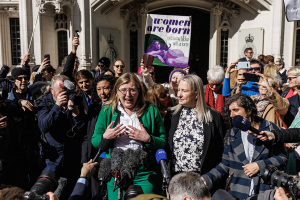Meeting People's Four Deepest Needs
Jesus told us that he came so that we would have "life to the fullest" (John 10:10). If that was Jesus' goal while he was on earth, don't you think that should be a goal of the church?
Most people aren't living life to the fullest. Sure, most people have full lives. They're always going from one place to another, from one accomplishment to another, and often from one relationship to another. Many people's schedules are full, but that's a far cry from living life to the fullest.
First and foremost, living life to the fullest starts with Jesus. We cannot have a full life without him. Salvation is the starting point to a life fulfilled, but it's not the end. There are a lot – I mean a lot – of unfulfilled Christians. And that devastates our witness to the world.
After salvation, a fulfilled life is one where four basic needs are met. God has uniquely called the Body of Christ to meet those needs. In this issue of Toolbox, I'll share those four needs and how the church is best equipped to meet them.
Support: Everyone wants to know they're not alone. God said in Genesis 2:18 "It is not good for man to be alone," but there are a lot of factors in today's world that are causing us to be more alone.
Urbanization: The vast majority of us live in cities, and we don't know our neighbors.
Specialization: We're increasingly separating people into different boxes – further isolating ourselves.
The breakdown of the family: In just a few generations, we've gone from the extended family to the nuclear family to the single-parent family.
Materialism: To many people, things have become more important than people.
People are coming into your church searching for something to belong to. They want to know they aren't alone. They want to know someone cares about them.
That's where the church steps in. God designed the church to be a family (Ephesians 2:19). Small groups are crucial to this. That's where we meet the need for support in people's lives.
Stability: People are looking for a strong foundation to build their life on. Pastor, this may surprise you, but people want absolutes to center their life on. Every study you read about truth these days says people don't believe in absolutes anymore. The sad part is that even regular church goers aren't acknowledging absolute truth. But if you have no absolutes in your life, you're asking for anxiety and stress.
Deep down, the people in your community know that. Those who walk into your church this weekend want absolutes to build their life around. Whether they want to admit it or not, they're looking for principles to help guide them. Until people establish an authority in their life, they'll never have life to their fullest.
You have an opportunity to do that. We must teach people that God's Word is that kind of authority. It's an anchor that we can depend upon when life gets rough.
Self-expression: God made us all a unique mix of gifts, passions, abilities, personality, and experiences. And he gave us an irrepressible desire to express our uniqueness. When we can't express that uniqueness, it produces frustration, dissatisfaction, and boredom.
The vast majority of men and women who'll walk through your church doors this weekend – and the vast majority of people you're trying to reach – are bored out of their mind. They have no opportunity to express their uniqueness. Often, the media, their jobs, their family, and their friends are trying to stuff them into a box that makes them just like everyone else. When they come to your church, they're hoping you'll help them express that uniqueness.
Your church should be that kind of place. Help them discover their uniqueness by finding out about their S.H.A.P.E. (spiritual gifts, heart, abilities, personality, and experiences). Teach them how to minister through the unique way God created them.
Significance: We all want to know our life matters. We want to be part of something bigger than ourselves. We've been wired for this. Man's search for meaning wrote the history of the 20th century. Communism and nationalism thrived because people long to be a part of something bigger than themselves. Today, radical Islam operates in that same way.
We should corner the market on meeting this emotional need. You and I are a part of the biggest mission imaginable – sharing the Good News about God's Kingdom. I can't think of any bigger mission to center our lives around. As we help people see their unique part in this mission, we're meeting this huge need in their lives.
Philippians 2:13 in the New English Bible says, "For it is God who works in you, inspiring both the will and the deeds for his own chosen purpose." God has a purpose for our lives even before we were born. One of the greatest things we can do for people is help them to discover that. What is their unique mission? How does God want to use their uniqueness to tell his story? Your church has the opportunity to help people discover that.
Romans 5:2 sums up my heartbeat for Saddleback and what I hope is your heartbeat for your church: "We can confidently and joyfully look forward to actually becoming all God has in mind for us to be." I want to be able to say that I've helped my congregation become all God wanted them to be. That means I have to be meeting these four basic needs in the ministry of our church.
Of course, here's the underlying message to this article: If you're built around the biblical purposes of the church (worship, fellowship, discipleship, ministry, and evangelism), you're meeting those needs. A church committed to fellowship meets the need of support. A church committed to discipleship meets the need of stability. A church committed to mobilizing members for ministry meets the need of self-expression. And a church committed to evangelism and missions meets the need of significance.
So here's the question, is your church meeting those needs?





























